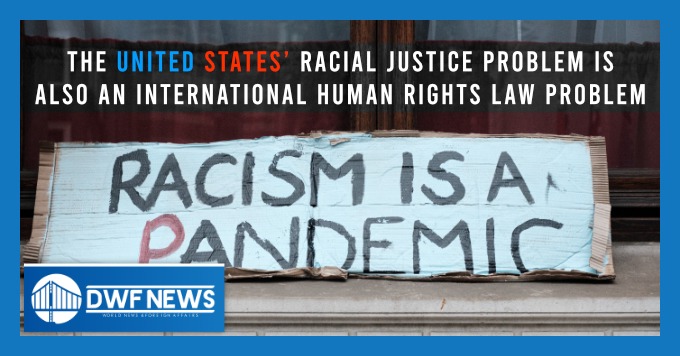The United States has ratified the most comprehensive global anti-racial discrimination treaty—the International Convention on the Elimination Against Racial Discrimination (ICERD). It only did so in 1994, almost thirty years after the treaty came into effect.
Written by E. Tendayi Achiume
Editor Board Member | Just Security
July 14, 2020
Article originally published by Just Security
Today, I issued a statement joined by over 40 United Nations Independent Human Rights Expert mechanisms, on the national uprising in the United States against police brutality and systemic racial injustice. Many of us also joined national calls for urgent action to ensure accountability for the deaths of George Floyd, Ahmaud Arbery, Breonna Taylor, and many others. One reason it is important to look beyond the borders of the United States in the face of demands for seismic change on the racial justice front is that international human rights norms require and offer the foundation for a better system than the one currently in place in this country.
A now widely articulated criticism or concern is that the legal and policy frameworks that are supposed to provide accountability for and prevent racially discriminatory police misconduct are themselves part of the problem. As Fourth Amendment expert Devon Carbado has highlighted, U.S. constitutional doctrine, for example, “expressly authorizes or facilitates the very social practice it ought to prevent: racial profiling.” Law will not end structural racial injustice — but it can and should play an important part in the process. At the very least, law should not be part of the problem, and in the United States it clearly is. Part of the thought and action to chart solutions to this problem should include greater attention and commitment to the United States’ existing racial justice and equality legal obligations under international human rights law . . .
What is World Federalism?
World Federal Government (WFG)
Original Publisher
DWF NewsE. Tendayi Achiume is the UN Special Rapporteur on Contemporary Forms of Racism, Racial Discrimination, Xenophobia and Related Intolerance, and is the first woman to serve in this role since its creation in 1994. She is Professor of Law at the University of California, Los Angeles School of Law, and a research associate of the African Center for Migration and Society at the University of Witwatersrand in South Africa. She is also the Faculty Director of the UCLA Law School Promise Institute for Human Rights. The current focus of her scholarship is the global governance of racism and xenophobia; and the legal and ethical implications of colonialism for contemporary international migration. In 2016, she co-chaired the Annual Meeting of the American Society of International Law.
Related Articles
LIST of Articles DWF NEWS 5/28/25
Children, Civilians Burned Alive as Israeli Warplanes Target School, Home in Gaza Palestine Chronicle staff 'Can't Remain Silent' on Jewish Atrocities: Malaysian Foreign Minister Says at ASEAN Foreign Ministers' Meeting Aamir Latif Anadolu Agency ...
LIST of Articles for DWF NEWS 5/14/25
Should "Israel" Be Declared A Terrorist Entity? Kevin Barrett Israel Is Spiraling Ori Goldberg The Nation 'Our Position on Palestine Is Not Fringe' Janine Jackson FAIR Latecomers starting to join PEOPLE OF CONSCIENCE Multiple Western Press Outlets Have...
List of Articles for DWF NEWS 4/30/25
PEOPLE OF CONSCIENCE absent among WASP & Zionist elites Imperial Cowardice: Gaza & the Moral Collapse of the American Elite Mohamed El Mokhtar The Palestine Chronicle Where is the Arab Street? Asad Abukhalil Consortium News Gaza exposes the rot of...
Solving Global Problems
We can work together to make the world better

